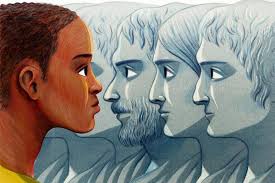Are Believers Dolts?

Google Image For years, I’ve done almost all my reading on Kindle, the Amazon e-reader. I prefer it to the printed page. With Kindle, I can carry around my library even when traveling. It has a back light so I can read regardless of light conditions. And e-books are substantially less expensive. One of the features I use regularly is that of trying a sample of a book before buying. It usually consists of a chapter or two so you can get a sense of the quality of the content and writing. On a recommendation, I recently read a sample of the book, Sapiens , by Israeli historian Yuval Noah Harari. The title refers to Homo sapiens, the human species to which modern humans belong. The book is about our evolution, pre-history and history. Promising Limitless Bananas It doesn’t take long to learn where the author stands on belief in God. In comparing the intellectual abilities of Homo sapiens to monkeys, Harari asserts, “You could never convince a monkey to give you a banana by pro...



